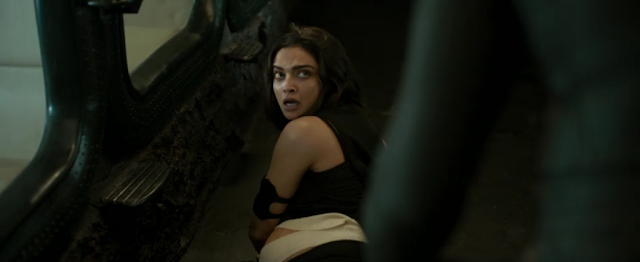Rudraksh (2004) is an ambitious action movie, mixing elements of the Ramayana with pseudoscience to create a martial arts fueled special effects extravaganza. It is also really bad. I don't normally say this right at the top when talking about a movie, but I think it's worth pointing out.
let's start at the beginning. In the early nineties, an archeological expedition in Sri Lanka has discovered what is apparently the capitol city of the rakshasa king Ravanna. They keep digging, because there's no way that that could possibly unleash an ancient evil upon the world. Labor contractor Bhuria (Sunil Shetty) spends his days walking around the whip site with a whip to keep the laborers working, and his nights smuggling artifacts out with the help of his girlfriend Lali (Isha Koppikar). After the archeologists dig up a large idol of Ravanna, Bhuria discoversd a secret compartment which contains Ravanna's rudraksha, the dried seed of an utrusam bean tree used as a prayer bead and the repository of Ravanna's power. Bhuria immediately becomes obsessed with the rudraksha, and after the archeologist take it from him he returns to the site and kills them all.
Years pass. Bhuria meditates on the rudraksha, gaining great supernatural powers. he also uses his hypnotic abilities to reshape Lali's mind, Chris Claremont style, transforming her from a slightly shady rustic woman to a sophisticated and ruthless assassin and eager accomplice in Bhuria's demonic schemes. Still, after all this time he has never been able to touch the rudraksha, and he knows that it is destined for someone else.
Meanwhile, research scientist Gayatri (Bipasha Basu) and her all-female team have arrived in India to search for evidence of psychic powers. All she finds are frauds, at least until she discovers Varun (Sanjay Dutt), a devout spiritual healer/martial arts instructor/nightclub bouncer with a mane of long hair that is probably supposed to evoke Fabio but kept reminding me of Samurai Cop. Varun is the real deal, able to help the afflicted by taking their pain into himself, and Gayatri thinks that he's really great, so much so that in addition to making him the center of her study, she's also dating him, because what are ethics, really?
She does have another subject, a man she calls "Pagal" (Raj Zutshi), who has been confined to an institution for years, is surrounded by an ominous black aura (kirlian photography is apparently a large part of Gayatri's work), and constantly chants a demonic mantra. Gayatri manipulates Varun into using his powers to help Pagal, causing the healer/martial arts instructor/nightclub bouncer to fall unconscious and confront a vision of Bhuria, who calls Varun "brother" before engaging in a spiritual katana fight.
That's not Gayatri's only bit of evil science, though. Her assistants have forced a lab rat to listen to a constant loop of Pagal's demonic chanting, which changes the rat's DNA and gives it mind control powers, which it uses to seize control of lab assistant Suzy (Agnes Darenius). Bhuria summons Suzy to his evil lair, then sends her to attack Gayatri as a test of Varun's skills. Varun and Gayatri travel to the Himalayas to visit his father Ved Bhushan (Kabir Bedi), a powerful sage, gives Bhuria the opportunity to attack and kill the old man.
And then the movie starts spinning its wheels in earnest - Varun and Gayatri research Bhuria's past, hoping to find clues about where he is and what he's planning. The problem is that the audience already knows about Bhuria's past, because it was covered in the opening scenes of the movie; Varun picks up a few extra details, but they don't really change anything and they are unreliable because Bhuria is using his hypnotic powers to mess with Varun's psychometric visions. And then Bhuria hijacks the TV to tell them where he is anyway, making the entire search for clues completely moot.
The main problem with Rudraksh is the writing; Gayatri spouts a constant stream of garbled pseudoscience and Varun responds with an avalanche of vague platitudes about God and the internet. And the movie takes itself far more seriously than a story involving sensual healing massage and death by rat hypnosis really should. Add that to the inconsequential search for information and padding by flashback, and the movie plods. The action scenes should inject a little life into the film, but they are similarly turgid and drowning in cheap CGI.
Sanjay Dutt almost manages to coast through this movie on sheer charm and make it somewhat watchable, but he really doesn't have much to work with. His best roles tend to be funny, and it's all just so po-faced that even he flounders. At times it is at least entertainingly bad; it turns out that the rat hypnosis is the high point. Still better than Samurai Cop, though.
.png)
.png)
.png)
.png)
.png)
.png)
.png)
.png)
.png)
.png)
.png)
.png)
.png)
.png)
.png)
.png)
.png)
.png)
.png)
.png)
.png)
.png)
.png)
.png)
.png)
.png)
.png)
.png)
.png)
.png)
.png)
.png)
.png)
.png)
.png)
.png)
.png)
.png)
.png)
.png)
.png)
.png)
.png)
.png)
.png)







